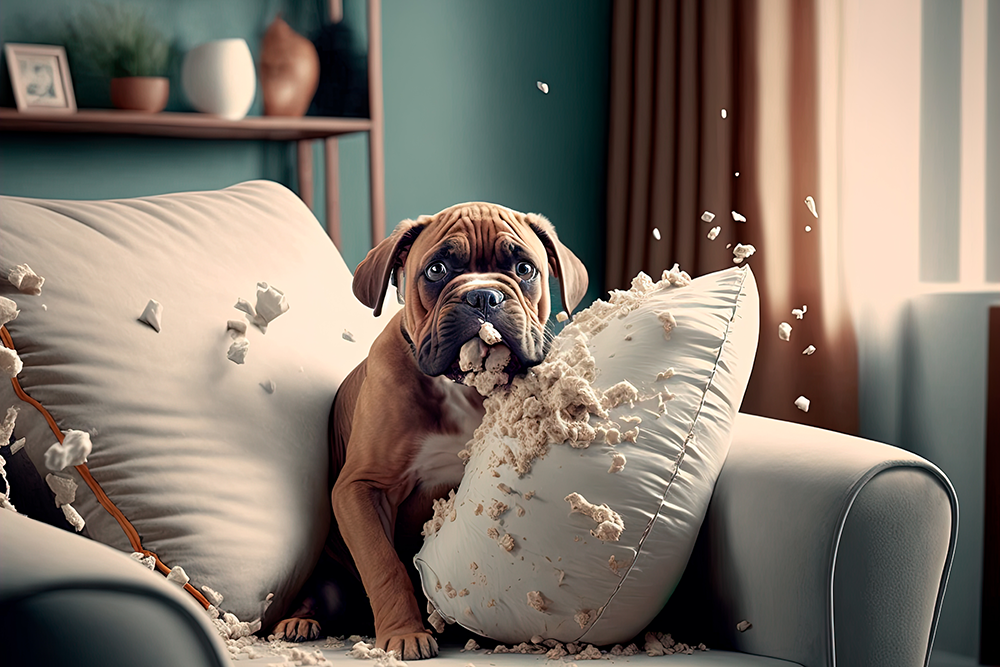Navigating Puppyhood: A Comprehensive and Practical Guide for New Pet Parents
Getting a puppy for the first time is exciting, but there is lots you need to know if you want to be a good pet parent. Learn how to raise your puppy the right way.

Bringing your new puppy home is one of the best feelings in the world, you suddenly have a new best friend and you love them, its a moment like no other, full of excitement, laughter, and nervous jitters. It's the beginning of a beautiful friendship that promises to bring companionship. love, and delightful chaos into your life. As a new pet parent, you're about to embark on a unique journey, one that's sure to be filled with remarkable milestones, and the occasional hurdle.
This comprehensive guide is designed to provide you with the insights and advice you'll need to navigate the world of puppyhood. With practical tips, expert insights, and plenty of encouragement, this guide will help you build a strong foundation for a lifetime of joy and companionship with your furry friend.
Bringing Your Furry Friend Home
The day your new puppy arrives home is a momentous occasion filled with joy, anticipation, and endless photo opportunities. To ensure this transition goes smoothly, it's important to prepare your home well in advance. A few thoughtful measures, such as puppy-proofing your home, setting up a designated space with a cosy bed and accessible water and food bowls, can make your new family member feel welcome and safe. Childproof gates are your friend!
Take the time to introduce your puppy to each room, allowing them to sniff and explore their new surroundings. If you have other pets or young children, carefully managed introductions are key to fostering harmony in your household. Also, keep in mind that the first few nights might be challenging for your puppy, as they adjust to their new home. A comforting toy or blanket in their sleeping area can make them feel secure, we all like having a toy.
- Puppy-proof your house: Remember, puppies are curious little creatures. It's important to ensure that there are no hazards like loose wires, toxic plants, or small objects within their reach.
- Create a comfy corner: A soft bed, some chewable toys, a food bowl, and a water dish should be part of your puppy's dedicated space. This will help your puppy settle in faster, having a place of their own.
- Introduce them gradually: If you have other pets or kids, ensure the introduction process is slow and gentle. Too much too soon can overwhelm your puppy, they need time to acclimatise.
What Should You Feed Your Puppy?
Proper nutrition plays a crucial role in your puppy's growth and development. A diet that's high in nutrients and specifically tailored for puppies can help ensure they grow into healthy, active adults. It's important to establish a regular feeding schedule and stick to it, which can also assist in toilet training.
Be mindful of portion sizes to avoid overfeeding, and remember that your puppy's nutritional needs will evolve as they grow. Talking to your vet can help you stay on top of these changes. Never feed your dog human food, and make sure that human food is always kept out of your puppy's reach.
- High-quality puppy food: Always choose a brand known for its high nutritional value. Look for food specifically designed for puppies, being British I prefer Lily's Kitchen who make quality puppy food.
- Follow feeding instructions: Overfeeding or underfeeding can be harmful. Most dog food packages come with feeding instructions based on the puppy's age and weight, but it really does depend on your dogs breed and the exercise they get. Do not let your dog become overweight.
- Avoid human food: While it may be tempting to share your food, remember that some human foods can be harmful to dogs. Always consult with your vet before introducing any new food to your puppy.
Routine Vet Visits
Building a good relationship with a trusted vet is an essential aspect of responsible puppy care. Regular vet visits provide an opportunity for your puppy to be vaccinated and dewormed, and for any potential health issues to be identified and addressed early. The vet will monitor your puppy's growth, administer necessary vaccinations, and answer any questions you may have.
During your visits, don't hesitate to ask your vet any questions you might have about your puppy's health, behaviour, or dietary needs. Your vet is a valuable source of professional advice and can provide guidance on everything from choosing the right food to understanding your puppy's behaviour.
Finding the right vet can feel overwhelming. A great resource to find a reliable vet near you is the American Veterinary Medical Association, or if you are in the UK the Royal College of Veterinary Surgeons. Their websites feature "Find a Vet" tools that can help you locate a vet in your local area.
Puppy Training: It's Never Too Early!
Puppy training is an essential part of raising a well-behaved and happy dog. Start training your puppy from the moment they come home. Basic commands such as 'sit', 'stay', and 'come' are not only useful but can also help keep your puppy safe.
Remember that consistency, patience, and positive reinforcement are key. Also, regular socialisation experiences are crucial. Encourage interactions with different types of people, dogs, and environments to help your puppy grow into a confident and well-adjusted dog, research indicates that the more social your dog is the longer life they will have.
- Start early: Early training can help prevent behavioral problems in the future, if you want a good dog then start early.
- Keep it positive: Always use positive reinforcement. This means rewarding good behavior, which encourages your puppy to repeat it.
- Be consistent: Use the same words and gestures for commands. This consistency will help your puppy understand what you're asking of them.
- Be patient: Remember, your puppy is learning. It will take time, but with patience and consistency, your puppy will start to understand.
- Socialization is important: Letting your puppy meet different people, and other dogs will help them become a well-rounded dog.
- Consider Classes: A puppy training class can be incredibly beneficial, the Kennel Club can help you find a local training clubs.
Let's Talk About Exercise
Puppies are little bundles of energy and require regular exercise to keep them healthy and happy. The right amount and type of exercise can also help prevent behavioural issues. Bear in mind, however, that puppies' growing bodies can't handle as much exercise as a full-grown dog. Regular, short bouts of exercise, combined with plenty of rest, are typically the way to go.
In addition to physical exercise, remember that your puppy also needs mental stimulation. Training sessions, puzzle toys, and new environments can all provide great mental workouts for your puppy.
- Keep it age-appropriate: Puppies have a lot of energy, but their bones and joints are still developing, never give them too much exercise.
- Mix it up: Different types of activities will keep your puppy entertained and well-exercised. Try a mix of walks, playtime, and training exercises.
- Puppy playdates: Organising playdates with other vaccinated puppies is a great way to socialize, and exercise your puppy at the same time.
- Kennel Club Guide: The American Kennel Club has an excellent article on exercise for puppies that you should read.
Grooming Your Puppy
Grooming is an important part of your puppy's overall care. Regular grooming can help keep your puppy's coat in good condition, reduce shedding, and provide an opportunity to check for any skin problems or parasites.
Start grooming your puppy at a young age to get them comfortable with the process. Use a gentle brush suited to your puppy's coat type, and a mild, puppy-friendly shampoo for bathing. Regular tooth brushing, ear cleaning, and nail trimming should also be part of your puppy's grooming routine.
- Regular brushing: This keeps your puppy's coat clean and mat-free by either wiping them down with a cloth, or giving them a bath.
- Bath time: Puppies don't require frequent baths. Too many baths can dry out their skin. Always use a puppy-specific shampoo.
- Nail trimming: Puppy nails grow quickly so trims are necessary. Be careful not to cut them too short, their are blood vessels in their nails.
- Teeth cleaning: Dental health is often overlooked, regularly brushing your puppy's teeth can help prevent dental problems in the future.
- Dogs Trust: The Dogs Trust provide more extensive advice on grooming your dog, check out their website for more info.
Love, Patience, and Lots of Treats
Raising a puppy requires a healthy dose of love, patience, and a good sense of humour. Despite the challenges you may face, the joys of puppy parenthood far outweigh the trials. Remember to enjoy the journey—each new day brings opportunities for learning, bonding, and creating lifelong memories with your dog, but some days they will test your patience, and make you mad.
The scratches you have all over your hands from your puppy biting you are perfectly normal by the way. Remember that dogs in general play with their teeth, and puppy teeth are super sharp. Its a phase, their teeth get blunter even if they never get bored of chewing on you. As I said, dogs play with their teeth, my own three year old labrador is under my desk nibbling on my feet as I type.
Remember they love you, and they don't mean to make you crazy. The journey of raising a puppy is a transformative one, not just for your puppy, but for you as well, a new puppy will teach you patience, and enrich your life in ways you haven't thought about. As you guide your puppy through their early life, you'll likely find that you've also grown a little too. It was that way for me at least.
Notes From Our Readers
If you take a look at the comments below, we have had some excellent suggestions which are worth adding to the article. Top tips from Paul Burke:
Be prepared for some regression. Puppies seem fearless when they are very young but as they grow they can become more afraid of some things leading to nervous barking. Be prepared to revisit things you thought you had already overcome.
Run your hands over your pup regularly, this will help form the bond with them, get them used to handling for things like nail clipping, and allow you to spot any physical issues like bumps or scratches early.
Recognise and reward the behaviour you want to see in your puppy, and consistently ignore the other behaviours that you do not want to see.
Remember, like most new pet parents, we figure things out as we go when we get our first puppy. The important thing is to make sure that you read as much as you can, and quickly learn how to care for your puppy. We have faith in you, and we think that you are going to be a great pet parent, so don't let us down.


